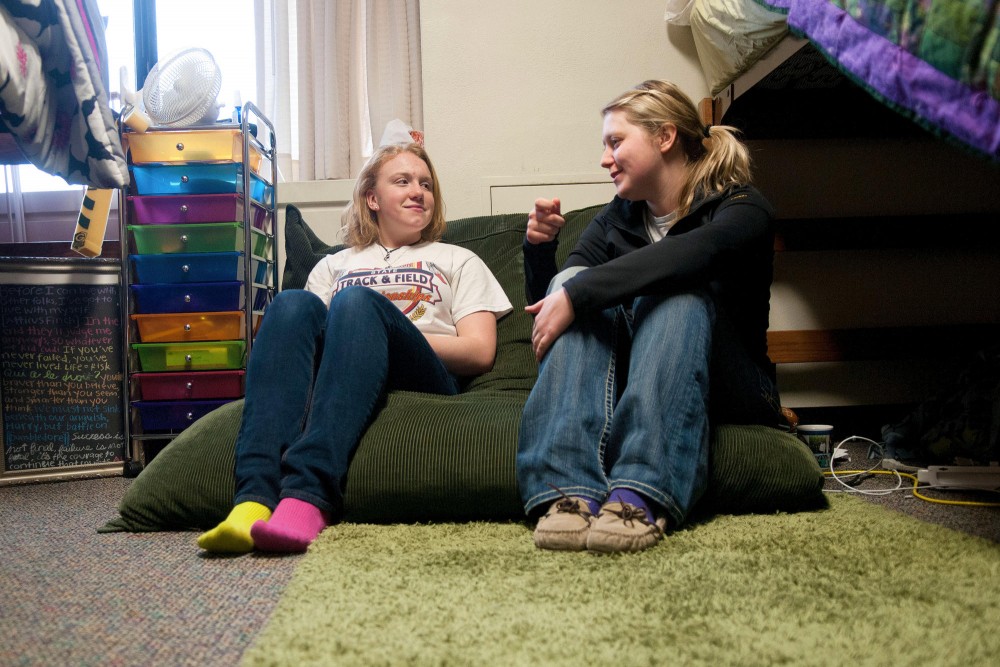Roughly 240 University of Minnesota students applied for 80 available community adviser positions for the 2012-13 academic year.
Housing and Residential Life began notifying applicants Wednesday night.
This year more than ever, students expressed interest in working with Living Learning Communities (LLCs) — housing where groups of students with common interests or majors live together in a residence hall.
Grant Anderson, coordinator for Housing and Residential Life, said selection is very competitive.
“We find that most of the students that apply are really exceptional students. They’re talented. They’re committed. They want to do it for all the right reasons, so it’s tough,” he said.
The process begins with an application, which leads to a 12-hour workshop where potential CAs are evaluated by Housing and Residential Life employees.
A week after the workshop, candidates have 20- to 30-minute interviews.
“Each candidate gets the chance to interact with two different members of our team as well as gets an opportunity to reflect on and share what they learned in the workshop,” Anderson said.
Residence hall directors review applications and evaluations to determine which applicants would fit best with their hall.
Anderson said the applicant pool was unique this year because of the increased interest in working in Living Learning Communities. There are 27 of these communities in University residence halls, including the GLBT-friendly Lavender House and the Biology House.
When they apply, CA candidates can indicate interest in up to four of these communities in addition to being able to eliminate four buildings they don’t want to work in.
Maura McManus, a French and global studies freshman, said she hopes to be selected as a CA in the Middlebrook Hall Honors Residential Community where she currently lives.
“It’s nice to be around students who you share some classes with and can relate to,” she said.
As of Wednesday night, McManus hadn’t heard from HRL about the position.
Graham Jenich, a mechanical engineering freshman, also applied to be a CA but found out Wednesday night that he wasn’t selected to be a CA for next year but was put on alternate status.
If someone doesn’t accept their CA position, his application will be reconsidered.
He wanted to be a CA to “create community for other people to thrive in.”
Like Jenich, McManus wants to build community for new students.
“I thought it would be a fun and rewarding challenge to create an environment for new students … because I have gotten so much out of the environment that the current CAs created for me,” McManus said.
She added she thought it would be a good way to save money, because community advisers do not have to pay housing fees.
Heather Roos, a marketing and political science junior, has been a CA for two years in Pioneer Hall’s substance-free LLC. She also admits the financial incentive pushed her to become a CA for two years. She said she, like McManus, was drawn to an LLC.
“I wanted the opportunity to educate people about issues surrounding sustainability, diversity and social justice and substance abuse,” Roos wrote in an email.
While Roos will not live on campus as a CA in the fall, she said the experience was rewarding.
McManus said she plans to either live in Middlebrook again or study abroad next year if not selected.
Though Jenich said he was disappointed about the position, he might be able to explore other options.
“It may be a blessing in disguise because I can now more easily explore the option of study abroad next year,” he said.
Before he found out, he was somewhat apprehensive about finding a place to live in the fall.
While he said he has options, it’s late in the lease-signing season.
“It’s definitely a lot harder to find a place so late in the year,” Jenich said.
Anderson said Housing and Residential Life has already taken steps to increase housing options for those not chosen as CAs. It moved back the deadline to apply for on-campus housing, and the CA application process is three weeks earlier than normal.
Though he knows there are many disappointed students who didn’t receive a position, Anderson said he and his staff are always impressed with the applicant pool.
“We are in the difficult position of sorting through so many amazing University of Minnesota students and finding the way to come up with the best of the best for our buildings.”


